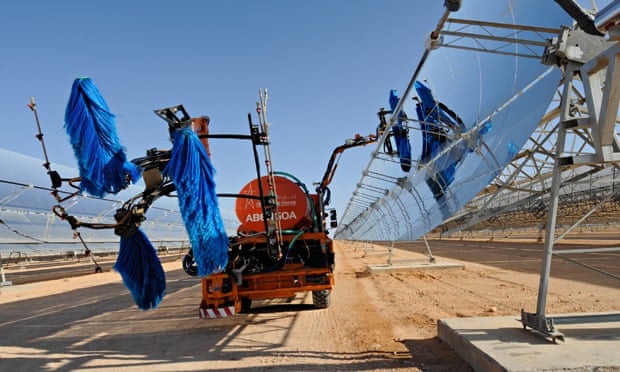Talking ahead of a UN climate summit in Peru next month, Kim said he was alarmed by World Bank-commissioned research from the Potsdam Institute for Climate Impact Research in Germany, which said that as a result of past greenhouse gas emissions the world is condemned to unprecedented weather events.
 Solar panels being cleaned at the Ain Beni Mathar Integrated Combined Cycle Thermo-Solar Power Plant in Morocco. The World Bank provided technical assistance and managed the overall project. Photograph: Dana Smillie/World Bank
Solar panels being cleaned at the Ain Beni Mathar Integrated Combined Cycle Thermo-Solar Power Plant in Morocco. The World Bank provided technical assistance and managed the overall project. Photograph: Dana Smillie/World Bank
"The findings are alarming. As the planet warms further, heatwaves and other weather extremes, which today we call once-in-a-century events, would become the new climate normal, a frightening world of increased risk and instability. The consequences for development would be severe, as crop yields decline, water resources shift, communicable diseases move into new geographical ranges, and sea levels rise," he said.
"We know that the dramatic weather extremes are already affecting millions of people, such as the five to six feet of snow that just fell on Buffalo, and can throw our lives into disarray or worse. Even with ambitious mitigation, warming close to 1.5C above pre-industrial levels is locked in. And this means that climate change impact such as extreme heat events may now be simply unavoidable."
But the bank, which has traditionally been one of the world's largest funders of fossil fuel projects and has been accused of adding to the problem of climate change, said it could not ignore the poorest countries' need for power.

